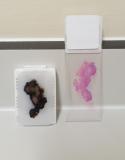Test Directory
BRAF mutation analysis
Containers - Adult

FFPE block / H&E slide / Pathology report
|
|
Laboratory Site
Old Dalkeith Road
Edinburgh
EH16 4SA
Transport arrangements
Referral specimens should be sent directly to Molecular Pathology at the above address (see transport recommendations). For patients with pathology specimens held within NHS Lothian there is no need to arrange transport of specimens.
How to request
Availability
Monday - Friday. 09:00 – 17:00
Anticipated turnaround
An integrated Molecular Pathology report should be available within 10 working days. See results.
Static information/disclaimer
Analysis by NGS and Pyrosequencing are all accredited to ISO 15189.
Please note, alternative methodologies may be used. Full details will be included in all reports.
General additional information
BRAF codon 600 mutations are present in 37 to 50% of melanomas. BRAF inhibitors (e.g. vemurafenib, dabrafenib) and/or MEK inhibitors have been approved for patients with metastatic melanomas harbouring BRAF codon 600 mutations.
There are two methods available for the detection of mutations in codon 600 of the BRAF oncogene: Next generation sequencing (NGS) and PCR followed by pyrosequencing. The pyrosequencing assay can detect any somatic mutations in codons 600 and 601 of the BRAF oncogene. The NGS panel assesses a larger region of the BRAF gene, for the full regions covered by the NGS panel, click here.
Melanin is a known inhibitor of PCR reactions which may lead to a higher than expected test failure rate in melanoma specimens (see factors known to affect Molecular Pathology testing).
BRAF mutation analysis is also used in colorectal cancer specimens as a prognostic indicator and to differentiate sporadic mismatch repair defects from inherited forms in screening for Lynch Syndrome, as well as in the diagnosis of thyroid cancer for cases with indeterminate cytology results.
For clinical advice on appropriate investigations, please contact our Molecular Pathology team.